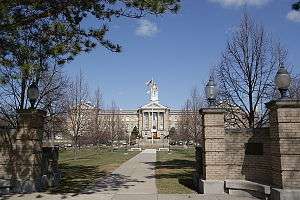Definify.com
Webster 1913 Edition
University
Uˊni-ver′si-ty
,Noun.
pl.
Universities
(#)
. [OE.
universite
, L. universitas
all together, the whole, the universe, a number of persons associated into one body, a society, corporation, fr. universus
all together, universal: cf. F. université
. See Universe
.] 1.
The universe; the whole.
[Obs.]
Dr. H. More.
2.
An association, society, guild, or corporation, esp. one capable of having and acquiring property.
[Obs.]
The
universities
, or corporate bodies, at Rome were very numerous. There were corporations of bakers, farmers of the revenue, scribes, and others. Eng. Cyc.
3.
An institution organized and incorporated for the purpose of imparting instruction, examining students, and otherwise promoting education in the higher branches of literature, science, art, etc., empowered to confer degrees in the several arts and faculties, as in theology, law, medicine, music, etc. A university may exist without having any college connected with it, or it may consist of but one college, or it may comprise an assemblage of colleges established in any place, with professors for instructing students in the sciences and other branches of learning. In modern usage, a university is expected to have both an undergraduate division, granting bachelor’s degrees, and a graduate division, granting master's or doctoral degrees, but there are some exceptions. In addition, a modern university typically also supports research by its faculty
The present
universities
of Europe were, originally, the greater part of them, ecclesiastical corporations, instituted for the education of churchmen . . . What was taught in the greater part of those universities
was suitable to the end of their institutions, either theology or something that was merely preparatory to theology. A. Smith.
☞ From the Roman words universitas, collegium, corpus, are derived the terms university, college, and corporation, of modern languages; and though these words have obtained modified significations in modern times, so as to be indifferently applicable to the same things, they all agree in retaining the fundamental signification of the terms, whatever may have been added to them. There is now no university, college, or corporation, which is not a juristical person in the sense above explained [see def. 2, above]; wherever these words are applied to any association of persons not stamped with this mark, it is an abuse of terms.
Eng. Cyc.
Webster 1828 Edition
University
UNIVERS'ITY
,Noun.
Definition 2026
university
university
English

Sherman Hall
Western Illinois University
Western Illinois University
Noun
university (plural universities)
- Institution of higher education (typically accepting students from the age of about 17 or 18, depending on country, but in some exceptional cases able to take younger students) where subjects are studied and researched in depth and degrees are offered.
- The only reason why I haven't gone to university is because I can't afford it.
- 1661, John Fell, The Life of the most learned, reverend and pious Dr. H. Hammond
- During the whole time of his abode in the university he generally spent thirteen hours of the day in study; by which assiduity besides an exact dispatch of the whole course of philosophy, he read over in a manner all classic authors that are extant […]
- 2013 July 20, “The attack of the MOOCs”, in The Economist, volume 408, number 8845:
- Since the launch early last year of […] two Silicon Valley start-ups offering free education through MOOCs, massive open online courses, the ivory towers of academia have been shaken to their foundations. University brands built in some cases over centuries have been forced to contemplate the possibility that information technology will rapidly make their existing business model obsolete.
Usage notes
- In western Europe, and later the United States, universities were typically founded by executive act (e.g. royal charter) and were generally relatively large (compared to colleges), offering postgraduate degrees in addition to undergraduate degrees. In other countries, this distinction is not made and any degree-granting institution is called a university.
- In the United States, students will sometimes say that they go to "the university" or to "a university", but they are far more likely to say they are going "to college", even if the institution they attend is a university. In the UK, students go "to university", without the article. In Canada, students go "to university" (also without the article) if they are attending a school that grants bachelor's or postgraduate degrees.
Synonyms
Hypernyms
Derived terms
|
Related terms
Translations
institution of higher education
|
|
See also
Scots
Alternative forms
Etymology
From Middle English, from Medieval Latin.
Pronunciation
- IPA(key): ['junəvɛrsəti]
Noun
university (plural universities)